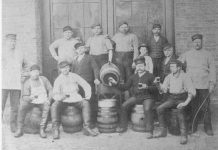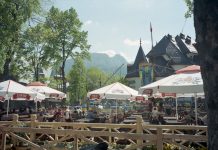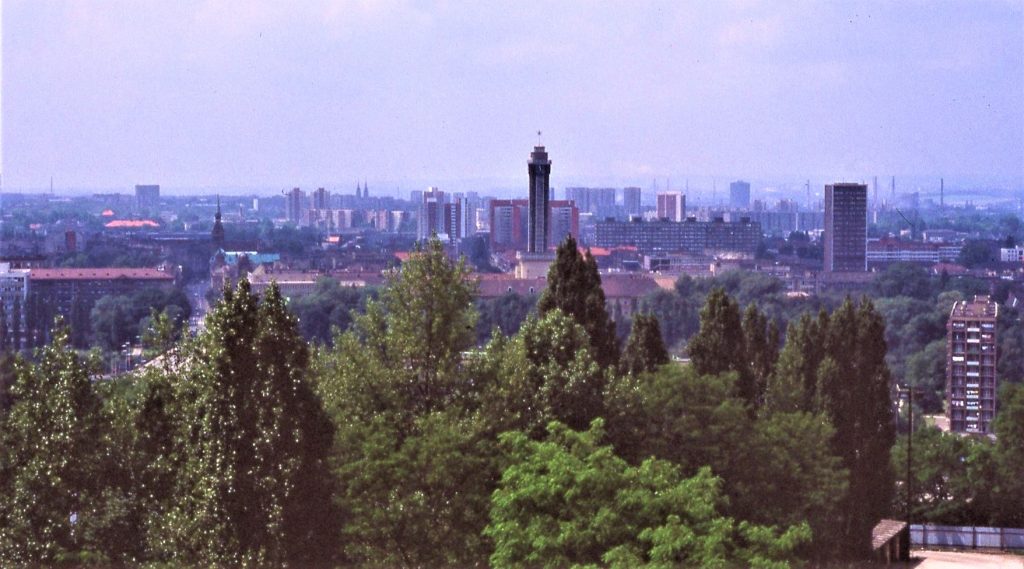
For me, drinking beer is not a performative exercise, even if cameos are allowed. Rather, my enjoyment of the brewer’s art tends to the contemplative. It’s an ongoing conversation, as well as an extension not only of reading, but learning itself, in its many varied forms. Beer is history, geography and culture, and a good pub is the place where they all come together, as was the case for me 32 years ago in then-communist Czechoslovakia.
—
A few beers in Ostrava in June, 1989
In the summer of 1989, the city of Ostrava was the old-school, coal-fueled, factory-filled Pittsburgh of Communist Czechoslovakia, and an extremely unlikely tourist destination.
However, my Czech émigré friend Ivan’s parents lived there, and they graciously consented to host me for two weeks. I arrived from Prague to find their house situated quite literally in the belching shadow of smokestacks rising from the Nové Hutě Klementa Gottwalda, a sprawling postwar steel mill named for Czechoslovakia’s founding Communist luminary, who incidentally was a syphilitic alcoholic.
Ivan’s father Alexander worked there as an engineer, and his mother Eva nearby as a secretary. Kind, curious and eager to hear my stories about her son’s life in America, Eva had engaged the services of a retired teacher, Ladislav, to help her learn better English.
Alexander was a hearty, extroverted, hard-working man. In addition to his responsibilities at Czechoslovakia’s largest steel mill, he maintained two cows, a copse of plum trees and a tidy vegetable garden on a miniscule plot of land behind his home.
Each day unfolded as a study in meticulously planned perpetual motion, punctuated by phrases in Alexander’s native Czech, as well as Slovak, Russian, Polish, German and the English he’d only started amassing when his son defected to America three years before my visit.
My very first full day in Ostrava began with a rainy, sooty and thoroughly bleak morning fully in keeping with the prevailing industrial landscape. Alexander had a few hours off work, and so he took me on a tram trip into the city center.
The tram trundled past block after block comprising the gritty steel mill’s grounds, culminating with the barracks-like campus of a technical school. Then came what might have been middle class suburbs during the interwar period of the 1930s, when Czechoslovakia was a prosperous democracy, prior to the ravages of Nazism during World War II and the subsequent moribund years of Communism.
We disembarked at Ostrava’s faded but vital central square. Alexander was quite well aware of my fondness for beer, and consequently we drank lunch at a nearby pub, where my chaperone was loudly hailed by a table of friends as we entered.
Was everyone playing hooky from work that particular day? Even before I’d finished mumbling garbled Czech pleasantries, a half-liter mug of local Ostravar beer was already waiting on the table in front of me.
The men were roughhewn, wearing simple work clothes and smoking acrid, unfiltered cigarettes, which I politely refused. Alexander’s friends worked dirty jobs and at first glance they might have seemed intimidating, but to a man, their eyes were bright and there was a jovial, genuine curiosity about the sheer novelty of an American landing in Ostrava.
As we all cradled those big, fluted mugs of draft Ostravar, I searched for something meaningful to say. Recalling the phrase that Ivan’s uncle Bohumil had taught me back in Prague, I downed my beer and let the words fly: “Chesko pivo je lepshi nez Americanitsky pivo.”
Frighteningly bad pronunciation notwithstanding, Alexander’s friends roared with delight, because I’d just informed them in their own tongue that Czech beer was better than American beer. Not only was it a fine way of breaking the ice, but the words were by no means insincere.
In 1989, the American-made craft beer revolution was still a faraway dream to a lad from flown-over New Albany, and the typically well-made Czech golden lagers never once got old. Although generally on the sweet side, tmavé (dark) lagers were seen here and there, and if you got really lucky, a strong bottom-fermented Porter might turn up.
In the days to follow, roaming and adventure kept me exploring. I bought a map of Ostrava, rode cheap public transportation and walked all across the city. Every now and then, I’d get a sausage and a bottle or two of beer, sit on a bench, and watch the city pass by.
—
Come Sunday morning during a light breakfast of coffee, cold cuts, tomatoes and cucumbers, Eva informed me that later in the afternoon there’d be a social visit or three. I was more than welcome to join them as they made the rounds.
Of course; I’d love to.
As his wife left the kitchen, Alexander leaned over conspiratorially, informing me that first, we had another important appointment to keep: “You must come to MY pub,” he said, taking pains to stress a regular customer’s sense of ownership.
Shortly thereafter we began a vigorous 15-minute walk to his neighborhood watering hole. Several streets into the stroll, there came a shortcut across a vacant lot, following a well-worn footpath until it intersected with a rough concrete sidewalk. This led down a ramp into a urine-stained pedestrian passage underneath the railroad tracks facing a deserted suburban rail station, where we exited the tunnel. Unkempt weeds peeped through the crack in the platform by Track 1.
The day was fast becoming hot and muggy as we reached a hilly street proceeding dustily into a hazy distance. Alexander abruptly halted and gestured at a small, nondescript building. I cannot recall discernible signage or any indication of it being a pub (or “pivnice” in Czech), although that’s what it was.
The door was open, and from our sidewalk vantage point, both beers and the customers renting them could be seen inside.
Square wooden tables were topped with clean, faded tablecloths. The room was small and sparsely decorated, and there was no bar as such, just a service counter in the Czech fashion of the day, extending outward on both sides of the draft beer dispensing station with a lone, solitary handle.
There was no kitchen, although crunchy snack items were available. A dozen or so males were smoking and drinking beer, and many of them also had small tumblers of indeterminate liquid arranged in a jagged lineup with mugs and ashtrays.
As I was about to discover, the liquid was none other than rum, albeit a spirit not to be confused with Caribbean rum as Americans know it, but rather the raucous Central European variant, an inexpensive concoction seemingly tasting of alcohol, brown sugar and artificial tropical flavorings – tasting somewhat like planter’s punch, without any of the subtle qualities one might expect from an expertly mixed cocktail.
Rum did the job, and was extremely popular with Alexander’s peers.
The brand of beer on tap is lost to my memory, although it surely would have been one of three dominant regional brands: Ostravar, Zlatovar or Radegast, all familiarly styled lagers in the pilsner mode, and each with a devoted, clannish following among the workers and soccer fans of Ostrava. Probably it was Zlatovar, and as such, perfectly acceptable, and in fact preferable to Pabst, Miler High Life, Milwaukee’s Beast or the ghost of Iron City.
—
A work buddy of Alexander’s was waiting for us. He had already gone through most of a pack of smokes, and the butts were threatening to spill over onto the tablecloth. The men began to gossip about work, with an occasional pause to attempt an explanation of the topic in their limited English. It was plenty enough to keep me entertained as the customers came, drank, and then went, preparing for their own Sunday social engagements, afternoon errands and sodden naps.
Soon a forty-something bearded man in a tank top began glancing at us from an adjacent table. After eavesdropping for several minutes, he caught Alexander’s attention and said a few words – maybe a joke, since the Czechs at my table were unable to contain their mirth at the stranger’s remark.
As it turned out, he had politely observed that Alexander was speaking very good Czech for an American, to which Alexander replied that nearly six decades of Czech living surely had broadened his language skills, but the only American in the room was this other fellow from Indiana.
In fact, the bearded man was a Cuban guest worker in Ostrava, and the delightful juxtaposition of imported North American “enemies” was too much for the locals to pass up. He was promptly invited to join us.
The Cuban called himself Freddie. He knew some English, and had learned passable Czech. As it transpired, he had a wife and children to support back home and had gotten married to a Czech woman, as he could find no compelling reason not to maintain a second family during what was expected to be a lengthy stay abroad.
As an adult, he’d already worked in Angola, Ethiopia and all around the East Bloc. For all I know, he might well have had a family near each workplace.
Alexander’s friends and Freddie got on well, but foreign guest workers tended to be the subject of disapproval in Ostrava. For one, they were a visible and irksome symbol of Czechoslovakia’s subservient status as Soviet pawn, but it also owed to what I interpreted as a thinly-veiled racism. Many of the guest workers were from Vietnam and Africa; they were “different,” and quite naturally kept to themselves, which was construed as threatening by natives already unwilling to accept their presence.
But it’s another story for another time, and a phenomenon by no means confined to Alexander’s sector of the globe.
As one might imagine, the afternoon dissolved quickly into the logic of liquidity. Shots of rum and fresh beers came and went like the skewered, rapid fire images in a music video.
Between gulps, we attempted to construct lists of words comprising all the languages present at a table that continued to attract newcomers as we drank. We’d count to twenty in Czech, English, Spanish, Russian, German and even French, then recite phrases (“I like to drink beer”) in each, ending inevitably by a collective and precipitous lapse into the slurred, ad hoc second language spoken by drinkers everywhere.
At some point, trudging back home far later than originally anticipated, we turned the corner to find Eva at the door, awaiting her husband and their American guest with a big iron frying pan in hand.
For a brief moment I contemplated flash sobriety, but as it turned out she was only washing the pan, nothing more. No injuries were suffered, apart from those afflicting my head the following morning. Our social itinerary on Sunday evening (coming down) went off without a hitch, albeit in an atmosphere of dignified, restrained silence.
More than three decades later, when I think back on my Sunday afternoon at Alexander’s neighborhood pub in Ostrava, it perfectly encapsulated my month in Czechoslovakia. The uncut weeds at the commuter train station, the dusty street, the threadbare yet functional pivnice and the Cuban guest worker combined to paint a picture of a nation caught in a time warp imposed on it from outside.
Yet more importantly, the chatter and shop talk of Alexander and his friends, my host’s exemplary work ethic and his well-organized days of achievement at home and at work, along with the multilingual conversations – simple yet comprehensible – revealed something about fundamental humanity, decency, and the similarities between the lives of people, no matter where they live.
Six months after the blurry Sunday recounted here, the Communist regime in Czechoslovakia crumbled almost overnight. Appropriately, the man who best symbolized the Velvet Revolution became the liberated nation’s first president: Václav Havel, a beer drinker and former brewery worker (he wrote a bit on the side, too). I persist in thinking that if Havel would have wandered into Alexander’s pivnice on the day of my visit, he would have fit in quite nicely at our table.
The names have been changed, except for Freddie’s and the playwright-turned president Havel. Photo credits: Ostrava in 1989; author’s collection.
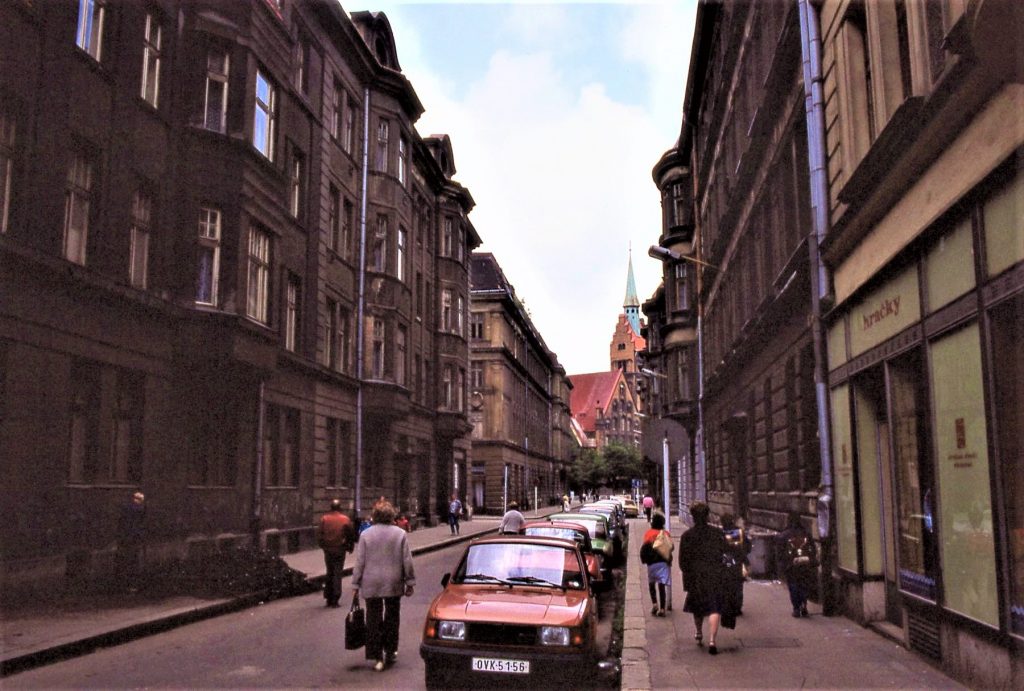



















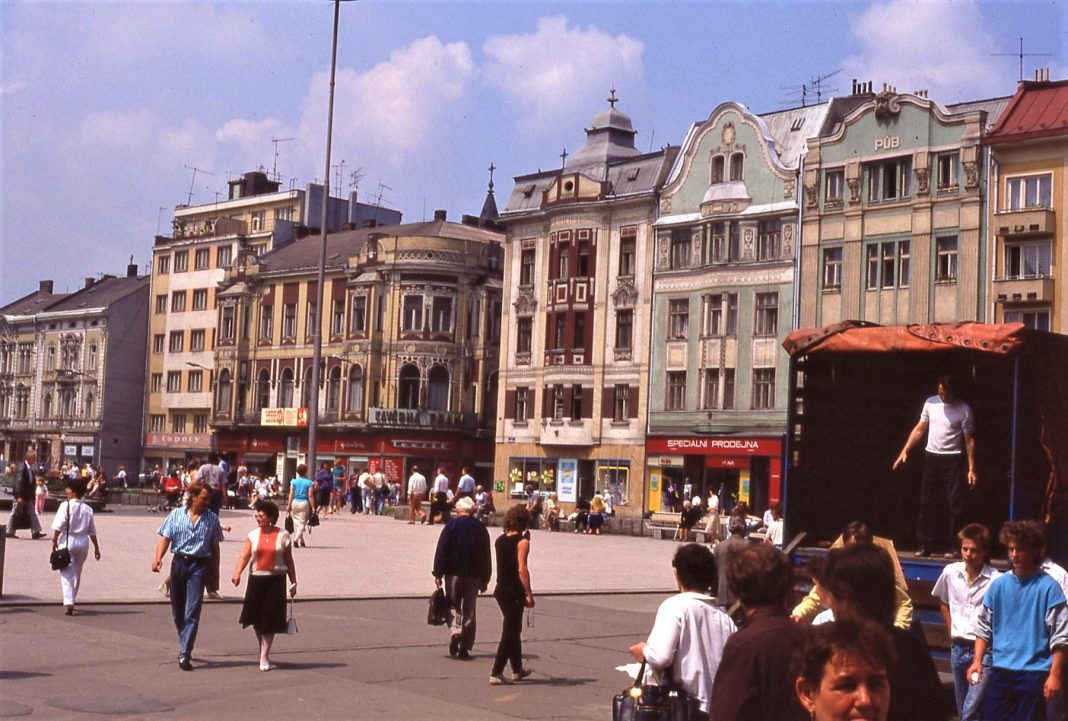
 Roger Baylor is an entrepreneur, educator, and innovator with more than 35 years of hands-on experience and expertise as a beer seller, restaurateur, and commentator. As the co-founder of New Albany’s Sportstime Pizza/Rich O’s Public House (which later became New Albanian Brewing Company) in the 1990s and early 2000s, Baylor played a seminal role in Louisville’s craft beer renaissance. Currently he is the beer director at Pints&union in New Albany. Baylor’s “Hip Hops” columns on beer-related subjects have been a fixture in F&D since 2005, and he was named the magazine’s digital editor in 2019.
Roger Baylor is an entrepreneur, educator, and innovator with more than 35 years of hands-on experience and expertise as a beer seller, restaurateur, and commentator. As the co-founder of New Albany’s Sportstime Pizza/Rich O’s Public House (which later became New Albanian Brewing Company) in the 1990s and early 2000s, Baylor played a seminal role in Louisville’s craft beer renaissance. Currently he is the beer director at Pints&union in New Albany. Baylor’s “Hip Hops” columns on beer-related subjects have been a fixture in F&D since 2005, and he was named the magazine’s digital editor in 2019.
